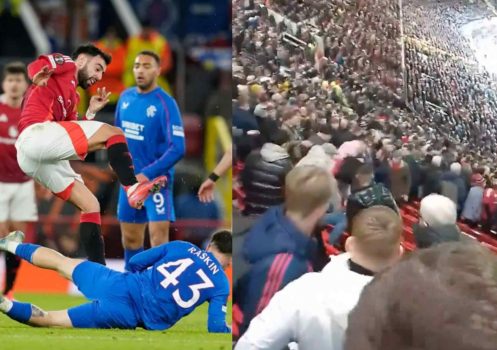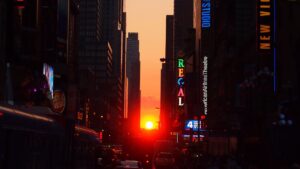The Europa League match between Manchester United and Rangers was overshadowed by violent clashes between fans, leading to 39 arrests. Rangers supporters infiltrated the home sections, resulting in brawls and heightened tensions both inside and outside Old Trafford.
 Pin
Pin Table of Contents
The Unfolding Chaos
The atmosphere was electric as fans gathered for the much-anticipated Europa League match between Rangers and Manchester United. However, the excitement soon turned into chaos. Reports indicate that fights erupted around the stadium, leading to dozens of arrests. The clashes were intense, with both sets of supporters involved in violent confrontations. Eyewitnesses described scenes of disorder, with police struggling to maintain control. The situation escalated quickly, resulting in injuries and significant property damage. Authorities have condemned the violence, emphasizing that such behavior has no place in football. Investigations are ongoing to identify all individuals involved. The incident has raised concerns about fan behavior and the effectiveness of security measures at major sporting events. Many are calling for stricter penalties and better preventive strategies to ensure the safety of all attendees in the future. The football community is left reflecting on the need for change to prevent such incidents from recurring.
The Ticketing Controversy
The chaos at Old Trafford wasn’t just about spontaneous fan aggression; it stemmed from a deeper issue with ticket distribution. Despite Manchester United’s strict measures to prevent away fans from accessing home sections—allocating tickets only to individuals on their database prior to the draw—Rangers supporters still managed to infiltrate these areas. Some Rangers fans admitted to purchasing tickets through third-party sites, raising questions about the effectiveness of the club’s ticketing policies. Eyewitnesses reported that official Rangers staff were seen at certain gates, seemingly facilitating the entry of their fans into home sections. This unexpected mingling of supporters led to heightened tensions and subsequent clashes. Manchester United has announced an investigation into how these breaches occurred, emphasizing that unauthorized ticket touting has become more challenging with digital ticketing but acknowledging it cannot be completely eliminated. The club has vowed to impose the strongest possible sanctions against those found responsible for these violations, aiming to prevent such incidents in the future.
The Role of Social Media
In today’s digital age, social media platforms play a significant role in documenting and disseminating events as they unfold. The recent disturbances at Old Trafford were no exception. Almost immediately after the clashes between Manchester United and Rangers fans, videos and images began circulating online. These posts provided real-time insights into the severity of the situation, showcasing altercations within the stands and confrontations outside the stadium. While such content offers transparency, it also has the potential to escalate tensions further. Some clips depicted fans throwing punches and objects, while others highlighted the challenges faced by law enforcement in managing the disorder. The rapid spread of this footage prompted widespread reactions from the public, with many expressing shock and disappointment. Authorities have acknowledged the impact of these viral posts and are utilizing them as part of their investigations. However, they also caution against the spread of unverified information that could exacerbate the situation. This incident underscores the double-edged sword of social media in modern sports culture, serving both as a tool for awareness and a platform that can amplify unrest.
Historical Tensions Resurface
The recent clashes between Manchester United and Rangers fans at Old Trafford have reignited memories of past confrontations. Notably, the 2008 UEFA Cup final in Manchester saw significant unrest involving Rangers supporters, leading to widespread criticism and legal repercussions. Despite efforts to improve fan relations and security measures since then, the underlying tensions between these fan bases remain palpable. The latest incident underscores the challenges in managing deep-seated rivalries that have been simmering for years. Both clubs have a storied history, and their supporters are known for their passionate allegiance. However, when this passion crosses into aggression, it tarnishes the reputation of both teams and the sport as a whole. The recurrence of such events highlights the need for ongoing dialogue, stricter enforcement of regulations, and proactive measures to address the root causes of these tensions. It’s a stark reminder that while football can unite, it can also divide, especially when historical grievances are left unaddressed.
Fan Experiences and Reactions
The recent disturbances at Old Trafford have left a lasting impact on fans from both sides. Many Manchester United supporters expressed their frustration and disappointment over the security breaches that allowed Rangers fans into the home sections. Some described feeling unsafe in their own stadium, with reports of confrontations and aggressive behavior. On the other hand, Rangers fans who managed to secure tickets in the home end recounted their experiences, with some acknowledging the tension their presence caused. The incident has sparked widespread discussion on fan forums and social media platforms, with debates about ticketing policies, stadium security, and fan behavior. Many are calling for stricter measures to prevent such occurrences in the future, emphasizing the need for clubs to ensure the safety and comfort of their supporters. The events at Old Trafford serve as a stark reminder of the importance of effective crowd management and the potential consequences when systems fail.
The Impact on Club Reputations
The recent disturbances at Old Trafford have cast a shadow over both Manchester United and Rangers, affecting their reputations. Manchester United faces criticism for the security lapses that allowed numerous Rangers fans into home sections, leading to confrontations. Despite implementing strict measures to prevent ticket sales to away fans in home areas, the club acknowledged that unauthorized touting cannot be completely eliminated. They have promised to investigate and impose the strongest possible sanctions against those responsible. On the other hand, Rangers supporters have come under scrutiny for their involvement in the clashes, with reports of aggressive behavior and confrontations with home fans. The incident has led to 39 arrests, including 26 related to previous disorder on Great Ancoats Street. Both clubs are now dealing with the fallout, as fans and the broader football community call for accountability and measures to prevent such incidents in the future. The events have highlighted the challenges clubs face in managing fan behavior and ensuring safety during high-profile matches.
Media Coverage and Public Perception
Major outlets like the BBC reported on the arrests and the nature of the clashes, providing a factual overview of the incidents. In contrast, tabloids such as The Sun and The Scottish Sun offered more sensationalized accounts, emphasizing the chaos and the number of arrests. TalkSPORT provided in-depth analyses, including fan reactions and discussions on the implications for both clubs. Social media platforms amplified these narratives, with videos and firsthand accounts circulating widely, influencing public opinion. The varied media portrayals have led to a spectrum of reactions from the public, ranging from calls for stricter security measures to debates about fan behavior and club responsibilities. This diverse coverage highlights the media’s role in shaping the narrative and influencing the broader conversation surrounding such incidents in football.
The Legal and Disciplinary Fallout
Authorities have confirmed 39 arrests related to the incidents, with 26 stemming from earlier disturbances on Great Ancoats Street. These arrests encompass a range of offenses, including public disorder and assault. Manchester United has announced a thorough investigation into the security breaches that allowed numerous Rangers fans into the home sections. The club has pledged to impose the strongest possible sanctions against those found responsible, which may include lifetime bans for individuals who sold or transferred their tickets in violation of club policies. Additionally, there is potential for legal action against those involved in the violence, both inside and outside the stadium. The Football Association is also expected to review the incident, which could result in fines or other penalties for both clubs. This situation underscores the serious legal implications of fan misconduct and the importance of stringent security measures at major sporting events.
The Broader Implications for Football Culture
Incidents of violence and disorder not only endanger individuals but also tarnish the sport’s reputation. Clubs, governing bodies, and fans alike must reflect on the underlying issues contributing to such behavior. This includes examining the role of alcohol consumption, the influence of extremist supporter groups, and the impact of socio-economic factors. Additionally, the normalization of aggressive behavior in football culture needs to be addressed. Promoting positive fan engagement, implementing educational programs, and encouraging respectful rivalries can help shift the narrative. The incidents at Old Trafford serve as a stark reminder of the work that remains to be done to foster a safer and more inclusive environment for all who love the game.





























